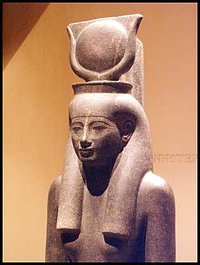History of Egypt
|
|
| This article is part of the History of Egypt series. |
| Ancient Egypt |
| Greek and Roman Egypt |
| Early Arab Egypt |
| Ottoman Egypt |
| Muhammad Ali and his successors |
| Modern Egypt |
| List of Egyptians |
The history of Egypt is the longest continuous history, as a unified state, of any country in the world. The Nile valley forms a natural geographic and economic unit, bounded to the east and west by deserts, to the north by the sea and to the south by the Cataracts of the Nile. The need to have a single authority to manage the waters of the Nile led to the creation of the world's first state in Egypt in about 3000 BC. Egypt's peculiar geography made it a difficult country to attack, which is why Pharaonic Egypt was for so long an independent and self-contained state.
Once Egypt did succumb to foreign rule; however, it proved unable to escape from it, and for 2,300 years Egypt was governed by foreigners: Persians, Greeks, Romans, Byzantines, Arabs, Turks and British. When Gamal Abdel Nasser (President of Egypt 1954–1970) remarked that he was the first native Egyptian to exercise sovereign power in the country since Pharaoh Nectanebo II, deposed by the Persians in 343 BC, he was only exaggerating slightly.
In this encyclopedia Egyptian history has been divided into six periods:
- History of ancient Egypt: 3000 BC to 332 BC
- History of Greek and Roman Egypt: 332 BC to 639 AD
- History of early Arab Egypt: 639 to 1517
- History of Ottoman Egypt: 1517 to 1805
- Egypt under Muhammad Ali and his successors: 1805 to 1882
- History of Modern Egypt: since 1882
See also
External links
- Egypt.. the past and the present (http://st-takla.org/Egypt-1.html)

